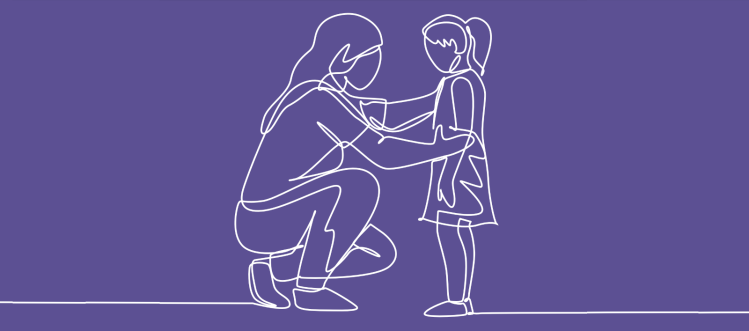Recognising signs of trauma in children impacted by war - a guide for parents
Executive Insight has done an extensive literature review and partnered up with Yuliia Yachnik, a Ukrainian psychotherapist, to develop a leaflet for families who have fled conflict zones. The volunteers were supported in this pro-bono effort by Ross Williams, a specialist healthcare writer, and Verb, a specialist creative agency in healthcare.

Zurich, Switzerland, 14.12.2022 – The idea was prompted by the war in Ukraine and seeing the need to support refugees leaving the country. We wanted to support parents in helping their children deal with trauma and encourage them to seek support for themselves and their families.
Spotting the signs and symptoms of war trauma in children
Even adults often struggle after traumatic experiences and children can find it particularly difficult to process these events. Yuliia Yachnik, MD, from the Institute of Psychiatry of the Taras Shevchenko National University of Kyiv: "Psychological trauma is an invisible wound, affecting all aspects of a child’s life. Some wounds heal on their own over time, others need additional support to fully recover. Helping a child get through difficult times, and restore and develop coping skills is the best thing we can do for their future psychological well-being."
It can be challenging for parents to understand how their child is coping with trauma: As children often have difficulties expressing their feelings, we as adults have to watch for certain signs or symptoms that may indicate a deeper issue and a need for professional support. Here are some of the most common signs to look out for. These may vary depending on the age of the child, and a child may only express some symptoms.
- Anxiety and excessive fears
- Avoidance or "shutting down"
- Depression
- Changed behaviours
- "Survivor's guilt" (feeling of guilt that they escaped while others were not able to)
- Hyperarousal (difficulty concentrating and sleeping, persistent irritability and aggression)
- Physical symptoms such as heart pounding, nausea, vomiting, headaches, stomach aches or chest pains
Children who have experienced the trauma of war may also experience high rates of mental health disorders, including post-traumatic stress disorder (PTSD), depression, anxiety, and attention deficit hyperactivity disorder.
Getting support is key to recovery
With support, trauma can be healed. Therapists can help children to process their traumatic experiences, and thus find ways to recover and live with them. If parents recognize some of the described signs and symptoms in their child, they should reach out for the help of specialized therapists.
Families can support each other through trauma
Although professional help is often required, families can still support each other through trauma. Parents can help their children by being patient, being ready to talk when they are, giving constant reassurances, and explaining that the child is not responsible for what happened. Promoting healthy behaviour when it comes to sleeping, eating, and activity can also support the mental health of traumatized children – as well as encouraging connections with friends of the same age.
The children of war
This article published in the New York Times examined how young lives were cut short, families were separated, and how futures were clouded by pain and loss. The author states that “The trauma of war hangs over a generation of Ukrainian children”. This should be a call to action to do what we can to help these children get the support they need.
You can find the leaflet in different language versions here:
You can download a pdf version of this press release here.
For further information please contact:
Executive Insight AG
Seefeldstrasse 301
8008 Zurich, Switzerland
Phone: +41 (0)44 389 75 10
E-mail: info@executiveinsight.ch
www.executiveinsight.ch
About Executive Insight
Executive Insight is a specialized healthcare consulting firm supporting biopharmaceutical companies in successfully preparing, launching and commercializing their products. The company was founded in 2000 by a group of industry professionals who recognized the need for specialized healthcare consulting. Today, Executive Insight proudly works for 6 of the top 10 global pharma companies and has 60+ employees located throughout Europe and beyond. The head office is located in Zurich, Switzerland with a subsidiary in London, UK. www.executiveinsight.ch
About Yuliia Yachnik, MD
Yuliia Yachnik is a Ukrainian psychotherapist. She has also been a trainer, technical assistant and consultant with WHO Ukraine since 2015.
About Verb
Verb is an independent creative and digital agency helping clients in the healthcare and pharmaceutical industry build connections in the digital age. www.verblondon.com
About Ross Williams
Ross Williams is a specialist writer in the healthcare industry. As an expert in healthcare industry who has written about countless disease areas, from Alzheimer’s to Zika Virus, he understands how to turn complex, scientific information into clear, concise and engaging content. www.writefirsttime.net


